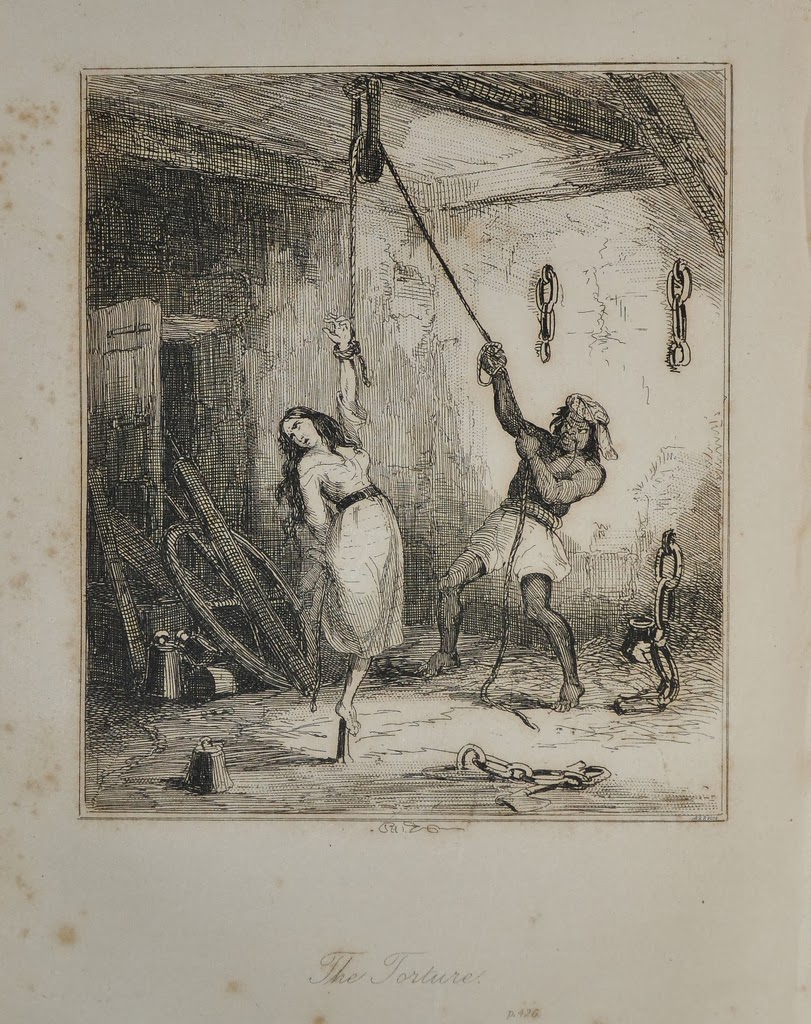|
Picket (punishment)
The picket, picquet or piquet was a form of military punishment in vogue in the 16th and 17th centuries in Europe. It consisted of the offender being forced to stand on the narrow flat top of a peg for a period of time. The punishment died out in the 18th century and was so unfamiliar by 1800 that when the then governor of Trinidad, Sir Thomas Picton, ordered Luisa Calderon, a woman of European and African ancestry to be so punished, he was accused by public opinion in England of inflicting a torture akin to impalement. It was thought erroneously that the prisoner was forced to stand on the head of a pointed stake, and this error was repeated in the ''New English Dictionary''. The punishment required placing a wooden peg (of the sort used for tents or for a line for cavalry horses; "picket" etc. were originally alternative names for such pegs) in the ground with the exposed end facing upward. The malefactor was typically a private soldier who had disobeyed orders. One wrist was sus ... [...More Info...] [...Related Items...] OR: [Wikipedia] [Google] [Baidu] |
Luisa Calderón
Luisa ( Italian and Spanish), Luísa ( Portuguese) or Louise (French) is a feminine given name; it is the feminine form of the given name Louis ( Luis), the French form of the Frankish Chlodowig (German Ludwig), from the Germanic elements ''hlod'' "fame" and ''wig'' "combat". Variations include Luisinha, Luisella, Luisana, Luisetta, Luigia, Luisel. Its popularity derives from the cult of Saint Louise de Marillac of Paris, and from Giuseppe Verdi's opera '' Luisa Miller''. People with the given name Luisa *Luisa Accati (born 1942), Italian historian, anthropologist and feminist public intellectual * Luisa Cáceres de Arismendi (1799–1866), heroine of the Venezuelan War of Independence *Luisa Baldini, Anglo-Italian news reporter and presenter, presently working for BBC News *Luisa Bradshaw-White (born 1975), English actress *Luisa María Calderón (born 1965), Mexican politician *Luisa Capetillo (1879–1922), Corsican-Puerto Rican writer and anarchist * Luisa Casati (1881� ... [...More Info...] [...Related Items...] OR: [Wikipedia] [Google] [Baidu] |
Trinidad
Trinidad is the larger and more populous of the two major islands of Trinidad and Tobago. The island lies off the northeastern coast of Venezuela and sits on the continental shelf of South America. It is often referred to as the southernmost island in the West Indies. With an area of , it is also the List of Caribbean islands by area, fifth largest in the West Indies. Name The original name for the island in the Arawak language, Arawaks' language was which meant "Land of the Hummingbird". Christopher Columbus renamed it ('The Island of the Holy Trinity, Trinity'), fulfilling a vow he had made before setting out on his third voyage. This has since been shortened to ''Trinidad''. History Island Caribs, Caribs and Arawaks lived in Trinidad long before Christopher Columbus encountered the islands on his third voyage on 31 July 1498. The island remained Spanish until 1797, but it was largely settled by French colonists from the French Caribbean, especially Martinique.Besson, ... [...More Info...] [...Related Items...] OR: [Wikipedia] [Google] [Baidu] |
Thomas Picton
Lieutenant-General Sir Thomas Picton (24 August 175818 June 1815) was a British Army officer who fought in the Napoleonic Wars. According to the historian Alessandro Barbero, Picton was "respected for his courage and feared for his irascible temperament". The Duke of Wellington called him "a rough foul-mouthed devil as ever lived", but found him capable. Picton came to public attention initially for his cruelty during his governorship (1797–1803) of Trinidad, as a result of which he was put on trial in England for approving the illegal torture of a 14-year-old girl, Luisa Calderón. Though initially convicted, Picton later had the conviction overturned arguing that Trinidad was subject to Spanish law, which permitted the use of torture. Controversy over the torture and Picton's role in the colonial slave trade revived in recent years. In 2020, Cardiff Council voted to remove Picton's statue in the "Heroes of Wales" gallery in Cardiff City Hall. In the same year it was reporte ... [...More Info...] [...Related Items...] OR: [Wikipedia] [Google] [Baidu] |
Strappado
The strappado, also known as corda, is a form of torture in which the victim's hands are tied behind his back and the victim is suspended by a rope attached to the wrists, typically resulting in dislocated shoulders. Weights may be added to the body to intensify the effect and increase the pain. This kind of torture would generally not last more than an hour without rest, as it would likely result in death. Other names for strappado include "reverse hanging", "Palestinian hanging" and . It was employed by the medieval Inquisition and many governments, [...More Info...] [...Related Items...] OR: [Wikipedia] [Google] [Baidu] |


.jpg)